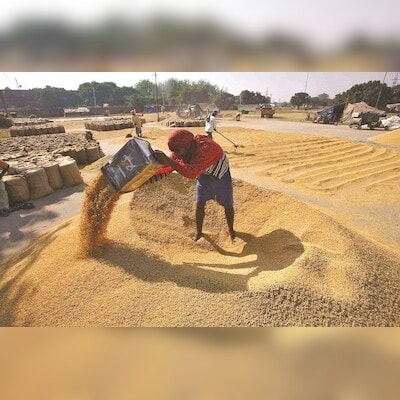The Centre has discontinued a sub-scheme that allowed private sector participation in procurement of government grains under the restructuring of the flagship PM-AASHA scheme to ensure minimum support price to farmers approved by the Union Cabinet.
Union Agriculture Minister Shivraj Singh Chouhan on Wednesday said that PPSS (Private Procurement and Dealer Scheme), which was earlier part of the set of schemes offered under PM-AASHA, has been scrapped as there was not much participation from private companies.
Chouhan was speaking to reporters on the sidelines of a press conference organised as part of 100 days of Narendra Modi’s third term.
The PPSS was run on a pilot basis for some time after the launch of Pradhan Mantri Annadata Aay SanraksHan Abhiyan (PM-AASHA) in 2018.
However, there was little participation from private actors as companies considered the 15 percent cap on remuneration to be too low in the event of a major price drop.
Chouhan also announced that he will meet farmers and organisations representing them from across the country every Tuesday from next month to listen to their grievances and address them.
The minister also said that no decision on GM crops will be taken unless there is a national consensus on the issue as it is a sensitive issue.
On the impact of late rains on kharif crops, Chouhan said the country’s kharif (summer) paddy production is expected to exceed last year’s levels.
“Paddy sowing has progressed very well due to good rains. Heavy rains in some areas like Andhra Pradesh and Telangana have caused damage but this will not reduce production. Overall, rice production will be better than last year,” he said.
Kharif rice, harvested around November, accounts for about 70 percent of India’s total rice production.
In the 2023-24 crop year (July-June), kharif paddy production stood at 114.36 million tonnes, according to the government’s third estimate. The minister said the total area under paddy cultivation has increased by 1.64 million hectares to 41 million hectares as of last week.
Coming back to the changes made in PM-AASHA, Chouhan said under the Price Deficiency Payment component, which is now similar to Madhya Pradesh’s Bhawantar Bhugtan Yojana (BBY), states can make payments up to 40 per cent of their oilseed production, which was 25 per cent earlier, but the scope of central support will only be limited to 15 per cent of the difference between MSP and modal rates.
First published: September 19, 2024 | 17:42 IS
Disclaimer:
The information contained in this post is for general information purposes only. We make no representations or warranties of any kind, express or implied, about the completeness, accuracy, reliability, suitability or availability with respect to the website or the information, products, services, or related graphics contained on the post for any purpose.
We respect the intellectual property rights of content creators. If you are the owner of any material featured on our website and have concerns about its use, please contact us. We are committed to addressing any copyright issues promptly and will remove any material within 2 days of receiving a request from the rightful owner.

